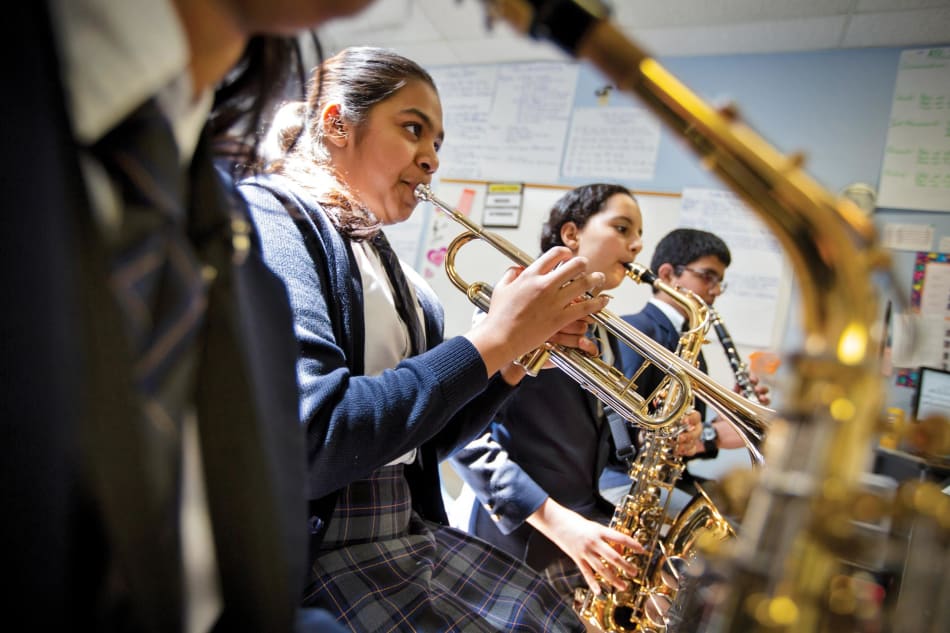Lynn-Rose School THE OUR KIDS REVIEW
The 50-page review of Lynn-Rose School, published as a book (in print and online), is part of our series of in-depth accounts of Canada's leading private schools. Insights were garnered by Our Kids editor visiting the school and interviewing students, parents, faculty and administrators.
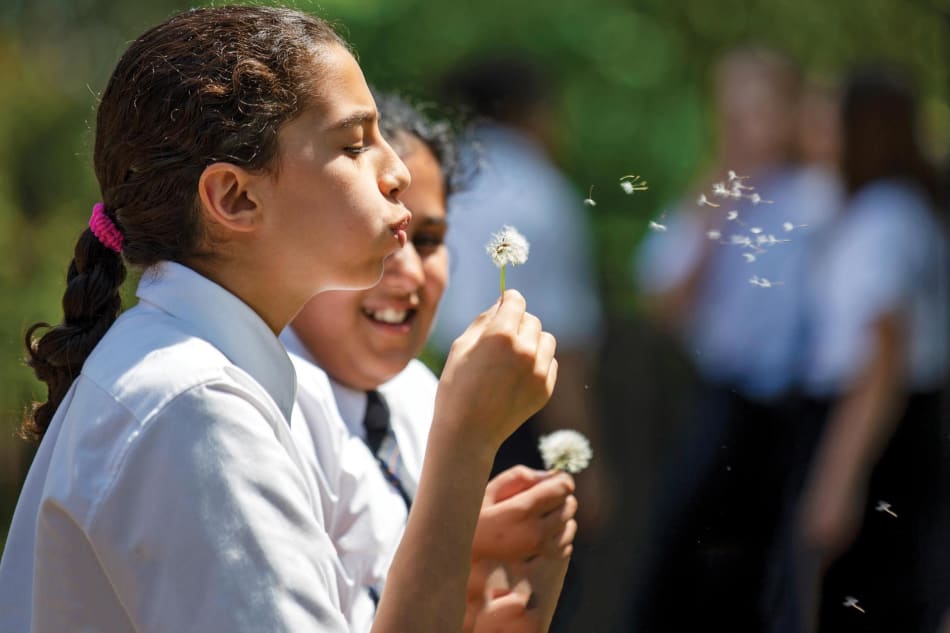
Introduction
The story of Lynn-Rose reaches back to 1987, with the opening of an academic preschool, and forward to the fall of 2018, with a new high school offering the International Baccalaureate Diploma Programme. Within that 30 years, founders Marie Attard and Tara Bullock have grown their academic institution in response to parent demand for a child-centred approach to education and for programming that responds to the unique needs of every learner.
As an IB World School, Lynn-Rose offers the Primary Years Programme (PYP) and Middle Years Programme (MYP), and it is working toward accreditation for the Diploma Programme (DP). As Sara MacDonald, the principal of the school, puts it: “Our philosophy of the school from its very beginning—with its emphasis on developing essential human traits alongside academic attainment—meshes very well with the IB program. In typical Lynn-Rose fashion, we spent a lot of time researching, working together as a school team, and talking to parents before making a decision to adopt the IB. We’re a very reflective school! In the end, we knew it was right for us and we ploughed ahead.” Since the fall of 2018, students have had the option of attending the new high school, Lynn-Rose College, rather than having to leave for a local public high school.
The school and its welcoming, friendly community stand out in vibrant contrast to its commercial surroundings. Every hallway, classroom, and gathering space is infused with a family feeling and sense of caring. Student work is displayed on the walls and there are windows into every classroom, which is both inviting and informative. Dig a little deeper, and beneath that warm atmosphere lies a consistent application of a handful of core values—some established early on by the school itself and others embedded in the adopted IB philosophy. Those values can be found in every aspect of the school, from its academic program, to its collaborative approach, to its student support. With three decades of history, Lynn-Rose has established a distinct culture throughout its primary and junior divisions, Lynn-Rose Heights, and carried it forward in the creation of Lynn-Rose College.
The school’s small size means that everyone is seen and known. Students of all ages greet each other in the halls. Teachers stop to chat with former students who have long since moved on to higher grades. This school rightfully prides itself on its academic program, but most visible when you step inside its doors is that relationships matter here. A lot.
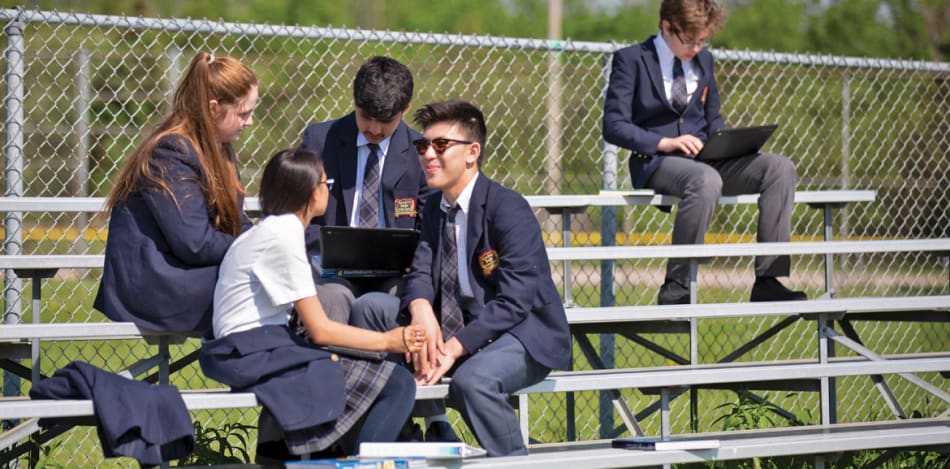
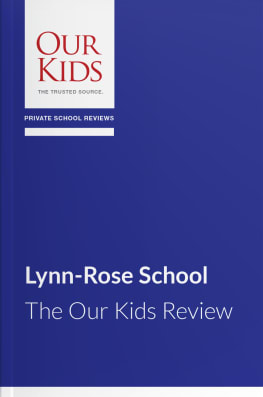
Key words for Lynn-Rose School: Strength. Wisdom. Integrity.
Basics
Lynn-Rose is a private, coeducational and non-denominational JK to Grade 12 school, with a student body (as of the 2018–19 academic year) that extends to Grade 11. Lynn-Rose College, the new high school established in 2017. The primary, junior, and high school campuses are all located in the Meadowvale East area of Mississauga, with JK to Grade 6 in two side-by-side buildings and Grades 7 to 12 a five-minute drive away. There are about 400 students enrolled in the school, with planned growth as the high school continues to develop. As with many private and independent schools, there is little faculty turnover, which has allowed Lynn-Rose to provide stability, a consistent culture, and a sense of familiarity as students and families make their way through the school.
The three campuses—Main for the primary students, Eastwins for the junior grades, and the College for the high school—are located in the heart of Meadowvale. There are many parks and green spaces nearby that have been incorporated into the school’s programming—including sports fields.
With the addition of the high school, Lynn-Rose is currently undergoing a significant transformation. The college is an exciting change for the older students, who get to have their own school with just a bit of a distance from the youngsters, along with new classrooms and labs, more space, and greater access to sports fields.
The addition of the third campus extends the school without altering its fundamental character. The school’s guiding principles of strength, wisdom, and integrity live on, though it is the IB learner profile, with its 10 distinctive qualities, that can be found in every classroom and corner of the school. It’s not that the original principles don’t matter—it’s that they are expressed in greater detail within the IB learner profile, whose traits are embedded with care and precision into the academic and co-curricular programs.
Principal Sara MacDonald is right when she describes the school as a place of “joy and enthusiasm.” Every room we entered contained kids who were busy, talkative, engaged, and plainly enjoying their tasks. One group of primary students we met were practically giddy with excitement over talking about their school. We were struck by their openness, readiness to share. Mainly, these youngsters were overflowing with energy, which sometimes erupted into hysterical laughter. Not lost to us, however, were quite sophisticated interpersonal skills—spoken language, recognition of each other’s non-verbal cues, encouragement for the quieter students to speak up, and an ease with adults not always seen in the youngest learners. Joy and enthusiasm indeed.
The school clearly benefits from having Ms. MacDonald at the helm. She is a highly committed, articulate, and insightful educator who sounds nothing like an on-point marketing brochure—yet she is the best advertisement this school has. No parent could miss her deeply empathetic and compassionate perspective, delivered in a refreshingly frank and honest manner. She knows how to educate children, how to talk to them, and all the remarkable and maddening things that they get up to. This is a person who will tell a parent exactly what is going on if their child is struggling with some aspect of school—no candy-coating—and then do everything in her power to help that student feel better, do better, and be better. Ms. MacDonald puts into action the Lynn-Rose belief that every child wants to learn, belong to a community, and do their best, no matter what behaviour may be seen on the outside.
As one parent puts it, “I trust this school and these teachers entirely with my child’s education and well-being. The kindness and care is evident everywhere. This place feels like home.”
Background
Before there was a Lynn-Rose, founders Tara Bullock and Marie Attard established Play and Learn Children’s Centres in Mississauga, offering a preschool with a stimulating academic program. Its child-centred approach to education, and its conviction that all children are capable and enthusiastic learners, solidified its success and grew its reputation. As a result, Bullock and Attard were plied with requests from parents to offer the next level of education for their children. In response, in 1997, Lynn-Rose was established as a primary school (JK to Grade 8) at what is now called its main campus, located on Millcreek Drive in Mississauga with some attractive landscaping and play areas.
The school soon expanded to a second building next door, a junior campus called Eastwins, which until 2018 housed Grades 6 to 8 and, in the 2017–18 year, a small handful of Grade 9s. In the fall of 2018, the high school campus opened. Lynn-Rose College now contains Grades 7 to 11 and will in the next year also offer Grade 12, freeing up some much-needed space for the primary and junior schools, which now range from JK to Grade 6. The College is located on 4 acres with a 30,000 square foot building, redesigned to meet the needs of high school learners, and is surrounded by playing fields.
In many ways, the story of Lynn-Rose is one driven by an internal fire and commitment to offering quality education in this area of Mississauga. Founders Bullock and Attard have undertaken the incredibly complex task of creating a high school that offers an Ontario Secondary School Diploma (OSSD), Advanced Placement (AP) credits, and the world-class IB Diploma. AP offers students the option to take college-level courses while still in high school, and the IB provides a globally recognized degree and the development of key learning attributes.
Offering the IB DP requires the appointment of a DP coordinator, which Lynn-Rose has in Lisa Little, who teaches Grade 9 and is also overseeing the delivery of the program. Teachers and administrators at the College will also need to receive IB-recognized professional development, become knowledgeable about the curriculum and assessment requirements, determine which students require learning support and how to provide it, educate parents and students about the DP, conduct self-studies on their own process of implementation, and be evaluated by the International Baccalaureate organization every five years. Lynn-Rose is on track for a 2019 accreditation by the IB organization to offer the Diploma.
It’s no small feat to enter into this educational milieu with its higher stakes: Ontario credits, standardized AP and IB exams, university placement, and the increasingly complicated world of teenage learners. That the school has arrived here in its history and is ready to do so says a lot about the enterprising spirit of the place.
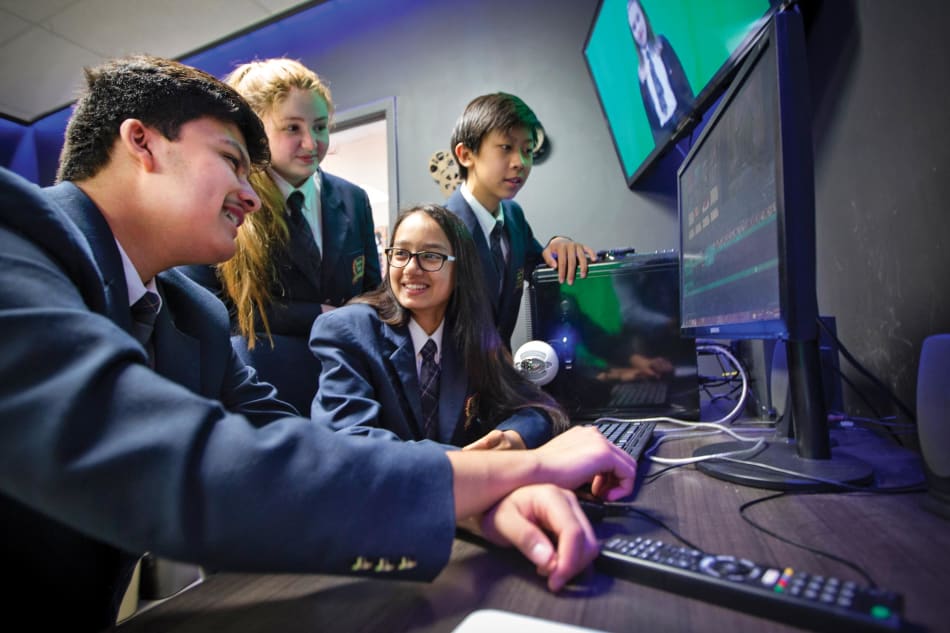
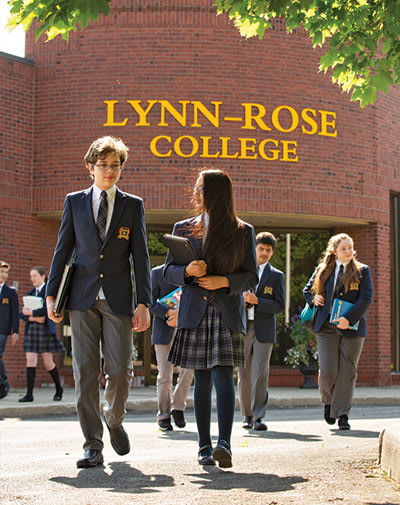
Academics
Being an IB continuum school means delivering on a promise of academic rigour and sustained personal development. There is much expected of Lynn-Rose students, which the IB learner profile encapsulates well: that they be inquirers, knowledgeable, thinkers, communicators, principled, open-minded, caring, risk-takers, balanced, and reflective. We saw the learner profile on display everywhere we looked, and many teachers explained to us how their students develop specific traits while working within the curriculum.
This is not “character education” in the insipid and largely failing way it tends to be practised in some settings: publicly posting the name of a monthly trait (such as compassion or honesty) that all school members are to exemplify and, perhaps, also devoting an assembly to it. There is much to say about the failure of character education—for example, that good behaviour is generally mistaken for good character—but its main weakness is that it remains external to students, an imposition from the outside. The IB, on the other hand, focuses on values relevant to students as individuals and also to the process of their learning, and it embeds those values into the curriculum. For example, successful student work may require the application of fairness and justice (principled) or the articulation of one’s own strengths and weaknesses (reflective). This approach develops human capacities rather than asking for a demonstration of acceptable behaviours.
With that said, Lynn-Rose’s statements about itself (such as on the Our Philosophy page on its website) come across as a little generic and diffuse in comparison with the sharply delineated system of thought that comes with the learner profile and overall IB designation. Putting on the hat of a prospective parent, we found ourselves more interested in how, specifically, Lynn-Rose interprets the IB approach for its students than in the school’s stated philosophy, guiding principles, or even official IB program descriptions. It’s not easy to encapsulate and live the IB curriculum, but the teachers did a better job of articulating it than the school’s published communications do. And in an odd way, that’s a win—you wouldn’t want it the other way around.
Primary Years Programme
Stacey Coombs is a teacher, the PYP coordinator, and the vice principal of the primary school. With a lot of balls in the air, she identifies collaboration as a chief strength of Lynn-Rose’s program. “Not only do we teach our young students how to collaborate, but the teachers do it in order to deliver an integrated curriculum. At this level, the teachers aren’t subject specialists, but they work closely together across the grades. We have planning days with a massive puzzle made up of sticky notes so the teachers can organize their units together, so that the whole year—and the progression from grade to grade—makes sense to the students. We want students to see connections and use their knowledge and skills from one subject to solve problems in another. We want transferability to be lateral and also vertical—to carry up the grades with the students.”
The primary school approach makes it a very busy place with a high demand on teachers to communicate and coordinate with each other while also being available to their own students. During the day we visited, Coombs was in and out of our room, chatting with us about the school while also being called away to meet with students. When we left, well after school was over, she was working one-on-one with a youngster who needed extra help. Every adult in a school like this wears a collection of hats. That is just the expectation here, but it doesn’t scare teachers away. In fact, most who come to Lynn-Rose stay a long time.
Take JK teacher Lisa Candido, who has been at the school almost 20 years and embodies the continuity of culture and practice that Lynn-Rose strives to maintain. She works with the youngest learners in the PYP Programme, taking them on a journey to help establish the bedrock required for inquiry, thinking, communication, and reflection.
Candido clearly believes that her students are capable of great things. One of their projects, which takes much of the year to complete, is a book report. Shepherding a boisterous flock of four-year-olds through the process of reading a book, writing about it, and presenting in front of the class is not easy work. “You never know what you’re going to get,” she laughs. “Honestly, just about anything can happen during the presentation. But the value of a multi-stage project for kids of this age is huge for nurturing their curiosity and developing their thinking. And we all know what it’s like to speak in front of people. Kids need practice, so we do that with the little ones. It’s risky for them, but they come out of it so pleased with themselves and so much more confident. And they are able to talk about their experience—what worked well and what went wrong. Seeing their development over the course of a year always amazes me.”
While the JK kids look like any ragtag group of tiny dreamers and acrobats—the school has windows in all of its classrooms that look out into the hallway, making it easy to “visit” without disrupting the energy of the room—the degree of self-discipline required in order to carry out the various projects that Candido assigns really is extraordinary. Hitting on the right expectations for children of this age is the sign of a veteran teacher with a long history in the school.
“There’s a reason why a person like me stays,” she explains. “It’s about the team—the leadership in the school and the close-knit faculty. The school has been through enormous change but also has the same feel that it always had. Bringing in the IB is one of those changes, and it has really pushed us to clarify and collaborate even more. That calls for long days, but it’s also invigorating. In the end, education is a human endeavour. People come first. We all share that view here. If the kids don’t enjoy coming to school, then something is wrong. That’s my starting point: are my students going home bursting to share their day with their parents? I hope so.”
One parent whose children have been through the PYP, starting in JK, explained how careful she was in her selection of Lynn-Rose: “When we looked at the public schools, we saw a focus on socialization in the Kindergarten classes, meaning it was mainly about how to get along, how to talk to each other, how to listen, how to co-operate. Those are important skills, but our girls already had them and were ready for more. They were counting and reading a bit. We wanted a program with enrichment and learning expectations. So we chose Lynn-Rose for that reason.”
“As our children advance through the school,” she adds, “I think the greatest impression on me as a parent is the emphasis on learning approaches—how to learn, what critical thinking is, how to tackle a problem. Creativity is encouraged. So are curiosity and a degree of mental toughness to take on a challenge and not give up when it’s hard. My kids are pushed just enough to deliver their best.”
Middle Years Programme
Once students reach the MYP (Grades 7 to 10), increased emphasis is placed on independent thinking, personal and community responsibility, a global mindset, and interdisciplinary learning. Lynn-Rose students are expected to embrace service and make a positive difference in the lives of others. And of course, they also work through the increasing complexities of their subjects, such as literature, science, math, the arts, and so on.
The day we visited, MYP students were showcasing the end results of their long-term community projects, which is an expectation of the program. These projects are self-directed and require an in-depth investigation of a topic with social, environmental, or global impact. When we entered the gym and toured the displays, students were bursting to tell us what they had learned and the actions they had taken. We approached one pair of students whose topic was water conservation, with a second pair right next to them focused on Indigenous rights and land ownership. The duos immediately entered into a friendly competition to win our attention. We listened to both and then issued them a challenge: Spend two minutes talking to each other to learn about how your topics overlap and where some common solutions lie.
The students were excited—it was like giving an impromptu topic to virtuoso debaters. They huddled and discussed, agreed on a plan, and then delivered a thoughtful talk as a quartet on the ways joint activism could help develop solutions in both areas. The best part of a school visit is seeing how students talk about and navigate their experience, and this was a highlight of our day.
Grade 8 English teacher John Berney summarizes the learning approach of the MYP: “It’s a program with high expectations, and not just academically—also socially and emotionally. We expect these kids to become productive citizens and contribute, and there’s a lot needed to get there. They have to learn how to think, solve problems, and collaborate. We impress upon them the opportunities they have. I say to them, ‘You need to use your power, you have a responsibility to become engaged with the world.’”
Berney also emphasizes that the MYP approach goes well beyond content knowledge. “In my area, I’m not really marking them on knowledge. How much can they know about literature and the world at this age? I focus more on conceptual understanding, on how to think and analyze and reach reasoned conclusions. The thing is, you can control knowledge. You can control memorization. But you can’t control a free-thinking child! I want to know what a student thinks and why and whether their position is defensible. That makes for a very lively classroom and, I’m guessing, some interesting conversations at home when kids assert their views with their parents.”
Michelle Lau is the MYP coordinator at Lynn-Rose. With the school having just launched its high school and in the process of establishing its Diploma Programme, there is much to do to ensure a seamless transition to the DP. Lau echoes Berney’s emphasis on thinking and discovery, which are mental skills and habits that students carry with them.
“We also emphasize hands-on learning,” says Lau. “In math class, for example, we don’t want students to receive information—say, a formula—and then memorize and practice it. We want them to discover the formula, to arrive at it themselves. For example, we’ll give them an orange. They have to come up with a formula for the surface. They start peeling it and figuring out what to do. Or for financial literacy, we set up a stock market. We want that real-life application. The more students are in a critical thinking and problem-solving mode, the better.”
Lau also explained Lynn-Rose’s unique and highly flexible math program in Grades 7 and 8. Math is broken into four levels, with students of different ages but similar ability working together. This allows for more precise tailoring to individual aptitude and needs. Students can move up a level without waiting to change grades, and if they complete level 4, which is considered advanced, they can earn a Grade 9 credit before high school. Lynn-Rose can easily rearrange its math classes based on ability, and parents respond well to the agile programming.
Diploma Programme
The DP is a Grade 11 and 12 program that culminates in a group of external exams set by the IB organization. Students earn a level (1 through 7) on each exam, where a level 5 is good, a 6 is very good, and a 7 is excellent. High-achieving students will earn 6s and 7s in six subject areas: language and literature, language acquisition, individuals and societies, sciences, mathematics, and the arts. In addition, the DP requires students to take the Theory of Knowledge (TOK) course, write an extended essay (EE), and complete a Creativity, Action, Service (CAS) project. There are also internal assessments established by the individual schools to guide the students and provide feedback.
Lynn-Rose is currently developing its DP curriculum and seeking authorization from the IB organization. The authorization process takes several years, from the request for candidacy through the completion of curriculum documents, implementation of a professional development plan for the faculty and staff, a visit from the IB organization, and the final decision. The school is aiming for a September 2019 launch of the DP, in time for its first Grade 11 class.
Lisa Little, Lynn-Rose’s DP coordinator, is still working through what will make the school’s offering distinct. With a background in philosophy and extensive research about student outcomes following graduation from the DP, she is currently considering placing more emphasis on the TOK course than do other schools.
“Each school places their stamp on the DP,” she explains. “We need to be true to ourselves and to this school’s ethos while also delivering an education on an international platform. Given the evidence that students find the TOK course to be invaluable after they graduate, we’re considering doubling the amount of hours required by the IB for delivering that course. Higher-level DP courses require 240 teaching hours while TOK only requires a minimum of 100 hours. We’re thinking of devoting 220 hours to it.”
An expanded TOK course fits well into Lynn-Rose’s emphasis on developing different ways of creating, thinking, and knowing. With future economies and employment sectors difficult to predict, any student graduating from a specialized university program with the ability to navigate several branches of knowledge—math, science, history, philosophy, and so on—will have a distinct advantage. University graduates today enter an international workforce, collaborate with experts from different regions and cultures around the world, and need to be able to connect to others while critically reflecting on their own beliefs and assumptions. It is not enough to know how to “do” math, science, or history. Future leaders need to have intercultural understanding and be able to evaluate a range of viewpoints well beyond their own. The TOK course is designed to build these capacities.
The DP is a work in progress at Lynn-Rose. Ms. Little thinks that students and parents will be excited by the option of graduating with an IB Diploma—especially given that local public schools can only accept a small percentage of students who want it—and by the school’s ability to personalize the program for the individual students and to stay true to the Lynn-Rose spirit.
STEAM
One strength of the IB curriculum extending throughout the entire school is how well it interacts with a balanced emphasis on science, technology, engineering, art/design and math (STEAM). For students to be future innovators and leaders, they will need to be adept at drawing from and making connections between these areas. Lynn-Rose offers a dedicated music room, a computer lab, and a media/design lab (with a green screen) in its junior campus to be sure it’s developing student creativity and expression as much as proficiency with the core academic subjects. The high school also provides similar specialized spaces, including a recording studio.
Music teacher Scott McQuaig does yeoman service, teaching every grade in the primary and junior campuses, plus leading a few extracurricular clubs. A musician his entire life who first earned his living by playing, he joined the Lynn-Rose faculty three years ago.
“Life changes when you have kids,” he laughs. “I’ve always had that teacher inside me. It’s a treat to bring that side out here with these kids. But you know, as much as I love music for its own sake, I’m aware that the vast majority of students are not going to become musicians. So while the program here helps to develop musical skills, I see the instruments primarily as a way to teach creativity, critical thinking, and collaboration. The kids learn how to play compositions and also how to create their own sections. They have to figure out how to work together, how to approach the music, how to solve problems.”
The school provides many opportunities to perform, such as French music at the French Café, the Art Gallery Night, and the holiday and spring productions. “Performance is important,” adds McQuaig. “That’s real life. But more than that, the learning they get from music applies in all their other subjects too. It develops their minds. That part matters the most.”
The music program starts in Kindergarten, where students begin using Orff (percussion) instruments until Grade 3, at which point they are introduced to the recorder. In Grades 4 and 5, students are trained on the violin (“Yes, that makes for some wonderful noise sometimes!” says McQuaig). Starting in Grade 6, they select their own band instrument (with guidance) and can carry on with music throughout their high school years if desired. Technology is integrated into the curriculum for older students who use computer programs for practice and compositions. For example, students can record themselves playing and then learn how to loop the track and layer in other sounds.
McQuaig’s point about instruments being vehicles to learn key mental and social skills is also true for the technology and design elements of the curriculum. Students use computers and media equipment to create projects for their various courses, exercising their ability to self-direct, think creatively, collaborate with others, experiment with forms of communication, and reflect on the nature of their own creations.
Like all accredited private schools, Lynn-Rose is inspected every two years by the Ministry of Education to ensure it meets Ontario standards in curriculum development, teaching, assessment, and evaluation. The school is also inspected every five years by the IB organization for the same reasons, and is undergoing accreditation with Advanced Education.
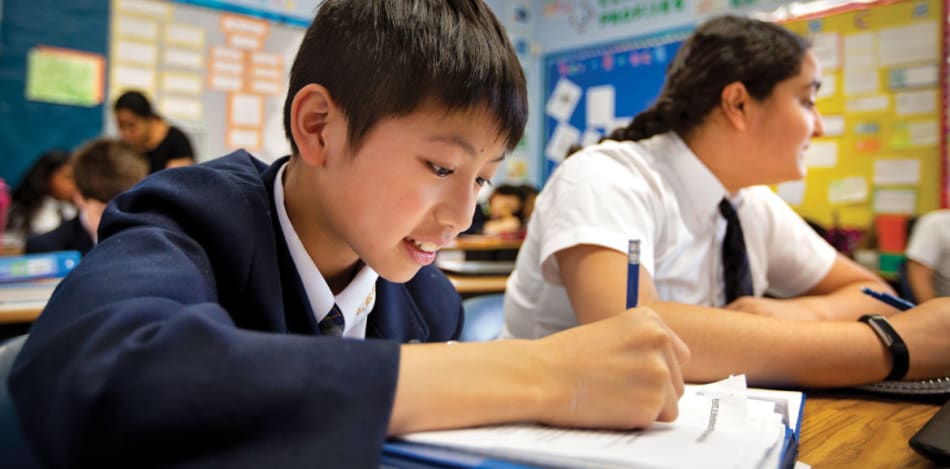
Student population
A visitor approaching Lynn-Rose may be underwhelmed by the humble surroundings. But once through the front doors, that first impression is immediately erased by the buoyant energy of the place.
It’s by no means mayhem—in fact, it’s quite an orderly environment—but children are children, and the Lynn-Rose assortment is particularly impish and delightful. The school culture shows itself here. The students are relaxed, open, and have the self-assurance, even at very young ages, to talk to visitors. And we mean really talk—as in stop and engage, listen, giggle at silly jokes, and then suddenly turn and carry on with their day.
The student population is also noticeably multicultural—and not in the “we’re shooting viewbook photos and need to artfully arrange our students” way. It’s more like a global community in miniature, with students of many backgrounds and cultures in every grade. In addition to a homegrown Canadian medley, a number of foreign nationals who have moved to Toronto from abroad for business reasons have kids enrolled here. The students and teachers spoke of the school’s diversity but had nothing special or pointed to say about it. It’s just the nature of the place. It’s perhaps worth noting, however, that if any prospective students come from a background with expectations of rote learning and memorization, this school will not be a good fit. The IB curriculum encourages student-led initiatives, self-direction, and discovery, which places Lynn-Rose on the progressive end of the education spectrum.
Students with exceptionalities and individual education plans (IEPs) are welcome here, so long as they are academically capable and comfortable in a fairly intimate setting. “Capable” doesn’t mean genius: there is a range of student achievement in the school, from grade level to advanced, with teachers able to differentiate instruction and assessment, thanks in part to the small class sizes. But “capable” does mean willing and wanting to learn. The school is a very busy place, with lots going on inside and outside the classroom. The pace can be rapid at times. And as mentioned, this is not a place where a kid can hide from the eyes and ears of peers and teachers. Students who prefer to live the unobserved life may be more comfortable in a larger public school.
When we talked to MYP students, we were struck by the range of interests they showed—this school is not a hothouse for future mathematicians and engineers (though there are some of those). One student was indeed very happy with the advanced math program, and another was excited about design and considering a future in structural engineering. Others were into English, creative writing, geography, science, and music. They agreed about a few things, though: how much they love their school trips (such as to Onondaga Camp and Washington, DC) and what the teachers are like.
“They really care about how we’re doing,” explains one student. “They want you to understand before moving on to the next step. And they go way beyond the basics into the depths of things. Sometimes I’m with a teacher one-on-one instead of in the bigger groups, when I need a little extra help. We also learn in small groups, which is good for me. Basically, the teachers push you. But you don’t get left behind if you get stuck. Someone in your class or your teacher takes the time to explain things another way until you get it.”
“That’s one thing I like the best,” agrees another. “The teachers listen to you and make sure you’re okay. They’ll show you something a different way if you didn’t get it the first time.”
These students are talking about differentiated instruction, where teachers design lessons based on student interest and learning styles, and continually assess and adjust so that everyone can learn. The students are evidently appreciative of this approach. They are also interested in learning. Not all are high-achievers in terms of grades (though many are), but as a group they are enthusiastic and engaged. This is the student culture. To fit in here, a new student to Lynn-Rose would be best served by a high level of curiosity, a desire to succeed, and the willingness to work hard.
Extracurricular programs
While one of the students we met was a keen basketball player both inside and outside the school, Lynn-Rose is not positioned as an athlete-development school. Its athletic facilities are modest and more suitable for students who love to play than for highly competitive athletes seeking to raise their game. The school belongs to the Small School Athletic Federation (SSAF) to provide opportunities to participate at a higher level of skill than found in intramural programs. Students compete with other schools in the GTA in both individual and team sports in all three seasons and also play intramural sports at the school during lunch.
Typical sports offered at the junior level include indoor soccer, basketball, flag football, softball, and cross country. Elementary students also play volleyball and basketball. No doubt the high school will offer a typical range of sports provided by schools as it continues to grow. The school also uses off-site venues to offer activities like gymnastics and swimming, and it outsources some options, such as martial arts.
When it comes to athletics, the emphasis at Lynn-Rose is on including and engaging all of its students rather than participating in elite-level competitions. Like all good schools, Lynn-Rose understands the importance of a healthy body and a balanced life, encouraging all students to challenge themselves physically.
The school also offers a variety of clubs, which can change on a yearly basis depending on student interest. This year, some of the offerings were spelling bee, dance/yoga, public speaking, robotics, debate, recorder, choir, and newspaper.
Mark Baldini, vice principal of the middle school, estimates that about 80% of the students participate in the extracurricular program. “We want to offer as many options as possible. It’s a promise we make to the parents, that there is something here for every child. We get good coaches for our teams and we’ve done pretty well in sports, as our banners show. We also host the flag football tournaments. But some children prefer clubs to sports and others are busy outside of school and participate in their activities then. It’s all good, so long as we offer a range of options that draws in most of the students.”
In addition to extracurricular programming, the school’s centrepiece event every year is the spring production, which involves every student in the school in an elaborate theatre production and positions teachers and students as writers, directors, lighting and sound engineers, and stage crew. It’s a year-long enterprise with a lot of moving parts, but the school is committed to providing all students with a focused and intense drama experience. The event is staged annually at the Meadowvale Theatre, which exposes students to a professional environment with backstage and technical areas to master.
Student well-being
Being an educator at Lynn-Rose means also being an advisor and mentor. The students let us know that they talk to their teachers about more than just their academics, such as conflicts with friends, passions outside of school, and worries that come up in their lives. There aren’t dedicated guidance counsellors at the school because, as Ms. MacDonald says, “All of the teachers and administrators are engaged in the social and emotional side of learning and growing up. We really know these children. We’re a family. Teachers check in with each other if they notice something off in a student, and they also talk directly to the student to see if everything is okay. And if a child is struggling with anything, we work with the parents as well. We don’t wait until a little thing grows into a big problem.”
She adds, “Every child is somebody’s child, you know? So we talk to the parents about their children. Our approach is intensive and time consuming. But that’s what we do. It’s the same when dealing with a student who may have made a bad decision. We talk to the student one-on-one. We want to understand where they’re coming from and how to help them fix the problem. If it’s a disciplinary matter, imposing consequences is a last resort. Yes, students have to learn that choices have consequences. But often we find a real reason for a bad decision—hurt feelings from a friend interaction or frustration at a test result or something. If you can relieve the root cause, help a child talk about their feelings and how they handled themselves, the behaviours invariably improve.”
The students confirmed the high degree of individual attention they receive, and the parents we spoke to told stories of support. One parent recalls: “One time in the school year, my daughter was overwhelmed by work. She was a big stress ball and visibly emotional. Her teacher sat with her and went through everything on her list. Together, they chunked out the work into reasonable amounts and also talked about coping techniques when stress creeps in. It was all handled thoughtfully and professionally and made a big difference in my daughter’s life.”
Parents talked about the typical difficulties that arise in a school—such as social cliques that exclude some children or aggressive behaviour on the playground—and how quickly teachers and administrators respond. They also talked about frequent communication from the school regarding their children. Lynn-Rose doesn’t just send out report cards every term. Teachers use Edmodo, a technology that allows them to post homework, test dates, and other pertinent information. Parents can then “see” what’s happening in classes every day. Teachers also communicate by email if asked and always do a monthly phone call. Basically, with an ongoing partnership between school and home, there are no surprises when the report card arrives.
In short, student wellness is a theme that runs through both the IB learner profile and the practices of the school. People look out for each other. With small classes, an intimate physical environment, and an emphasis on relationships, no student can fall through the cracks here.
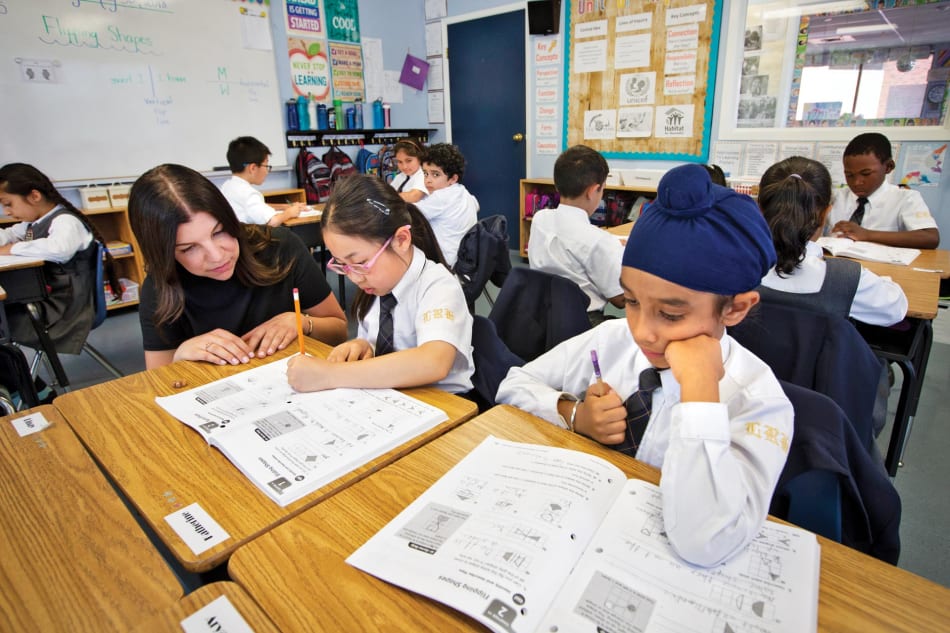
Getting in
As an IB school, Lynn-Rose is best suited for students who will make the most of a well-rounded approach to education. It’s a myth that only high-achievers can thrive within the program. In fact, the IB does a very good job of engaging and developing learners of all types. However, it does require pretty good organizational skills (which are fostered by the teachers) and a willingness to work hard. Homework can be heavy at times, and there is an expectation that students will gamely accept the challenge to push their own thinking in new ways. With the long-term projects in the MYP, and the extended essay and CAS requirements (including about 150 hours of community service) in the DP, a prospective Lynn-Rose student should be eager to engage with local and global issues, examine critically their own place in the world, and take action to make a difference.
Lynn-Rose prides itself on its academic program, and thus an academically minded student—one who enjoys learning—is mission-appropriate. But as noted, there is room for every kind of learner at this school. Lynn-Rose delivers on its promise to provide individual care and support for its students so that each one can find success in their studies.
Families are encouraged to visit the school in person when considering Lynn-Rose, either for a personal tour or to attend a regularly scheduled open house. One parent we spoke to was advised by the school to visit every possible option so they could make an informed decision. In the end, the parent told us, “We did look at a lot of schools. But we chose Lynn-Rose among other options for its family feel, which is important because schools play such a large role in raising our children; the facilities, which were intimate and not institutional; and the small class sizes, which make it possible to reach all kids, no matter their learning level.”
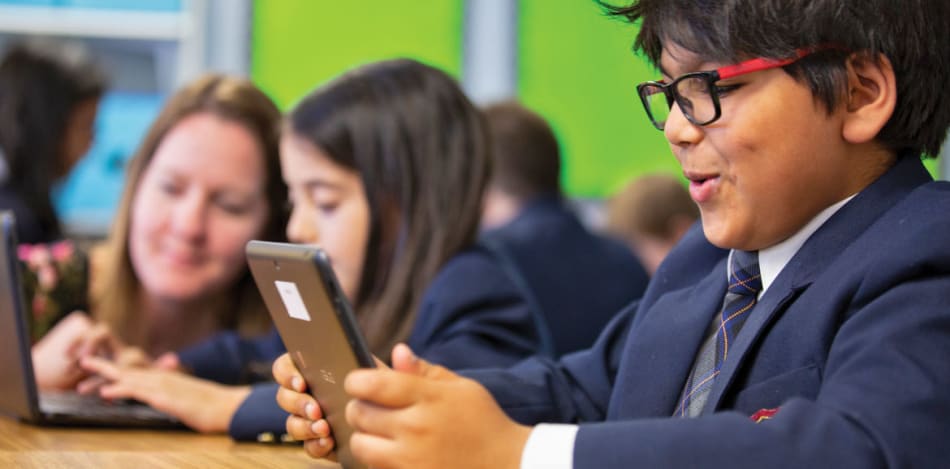
Money matters
Lynn-Rose’s fee schedule is clear, straightforward, and in the expected range for a private school, with slightly higher tuition for international students. Aside from a one-time development fee when a student is first enrolled, there are only two additional costs that all parents must pay: a material fee for JK to Grade 8 students and a laptop fee for Grade 6 to 8 students. If parents are interested in additional services—such as the before- and afterschool program, supervision during PD days or March Break, or busing—there are, of course, additional fees at either a single or family rate.
On the topic of buses: the school owns its own fleet and the buses will travel wherever is needed. In Mr. Baldini’s office, we examined a large, detailed map of the GTA with the location of every bused student marked. It was like parsing the London Underground, with students coming from all over Mississauga and Toronto and one travelling from as far as Caledon (think Watford Junction to St. James’s Park, if you’ve ever had the pleasure of riding the Tube). The parents we spoke to felt they were getting their money’s worth at the school and that education was a good place to make a financial investment. They recognized that there are substantial costs involved in providing the small classes and personal attention that they want for their children.
Parents
Because of the regular and frequent communication from the school, parents feel involved in their kids’ education. They like knowing what is happening at school—academically and socially—and they feel welcome to visit, attend all events, and volunteer to support everything that goes on in this busy place.
One parent, whose child was in a local Catholic school before coming to Lynn-Rose, noted the closeness of the entire community: “You get to know parents here as well as the teachers. We see each other every day, and even we adults don’t get lost in the crowd! It’s nice to feel like you belong, like other parents are part of your team. My kids feel at home here, and I know a lot of the parents do too.”
With the launch of the high school—and the complex scheduling, additional events, and increase in off-site excursions that naturally arise with teenage learners—it’s possible that a parent association may emerge in the future to further support the school’s ongoing growth. In addition, offering high school students the opportunity to connect to established professionals and experience real-life work environments is another potential area of growth for parent involvement.
The takeaway
“I have two very different girls,” one parent explains. “One is outspoken, strides ahead on her own, and needs a high level of challenge. The other is quiet and reserved and needs additional support and flexibility with assignments, which weren’t available in her previous school. Both of them thrive here. Once, one of my daughters, normally an A student, got a B on a test. The school’s response was to check in with her and then also say to themselves, ‘We have some work to do here.’ The level of attention and the effort teachers make are very high.”
This is a school where first impressions of a committed faculty and an inclusive atmosphere hold true. It is proudly a school that makes the most of its size. Students who want a more impersonal, lost-in-the-crowd, invisible life—and there are some who truly thrive in a leave-me-alone setting—may not feel comfortable here. It’s a warm place with a family feel that pours most of its energy into developing relationships and delivering the world-class IB program. That’s a fantastic one-two for those students who embrace the IB values and appreciate the breadth and globally minded philosophy of the curriculum.
For a school with three decades of history, Lynn-Rose impresses with its established and coherent culture of high expectations balanced with individualized student support. Many private schools bounce around a fair bit in an attempt to find their identity, sometimes trying to please everyone (which is not possible) or finding a niche so specialized that they stand out mainly for their rarity. Lynn-Rose benefits from starting out as an enriched, academically oriented preschool with equal parts reflection, compassion, and high standards of learning. Through its expansion over the years and its adoption of the IB curriculum, it has remained wholeheartedly itself. Families appreciate that consistency, and faculty stay on because they believe in what the school stands for.
“If I had to describe the purpose of this school,” says one parent, “I would say it’s unlocking the potential in kids. Teachers do that by making learning exciting, by letting kids explore. A kid can be whoever they want to be here, and everyone helps them find out who that is. As a parent, that’s what I want for my children.”
